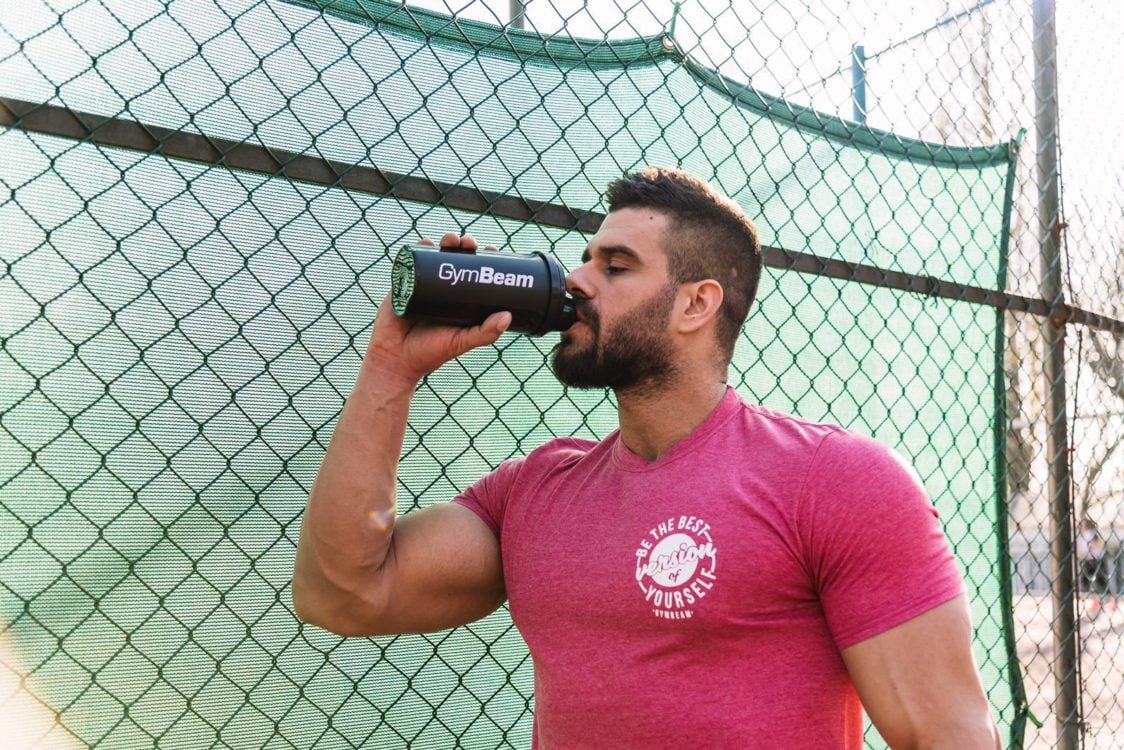Table of Contents
Endurance activities such as running, cycling or roller skating are among the most popular sports, especially in the warmer months. Typically, these activities are not as intense, but they can last for several hours. Particularly because of this, certain nutrients are depleted and need to be replenished during sports activity to maintain the intensity of performance. In addition to an optimal diet with enough energy, nutritional supplements can also help. Some of the supplements are also used before or during the activity and can thus support performance itself. In this article, you will learn what supplements should be available at home to any enthusiastic cyclist or runner who is concerned not only with the joy of movement, but also with performance itself.
What are the specifics of endurance sports?
Endurance activities differ from those of strength not only in duration, but also in other typical characteristics, which we will discuss below. [1–4]
- They normally last between thirty minutes and several hours. Activities lasting more than four hours are already considered ultra-endurance.
- They involve large muscle groups. Typically, the muscles of the lower half of the body are most involved.
- These are aerobic activities. There is an acceleration of the heart rate, normally above 50% of its maximum value for a particular athlete.
- Endurance is the ability to maintain a given load intensity over a period of time and thus withstand fatigue.
- For example, endurance sports include running, cycling, swimming, skating, mountain hiking, triathlon, as well as riding a rowing machine, exercise bike or ski erg.
- Endurance athletes have higher energy intake requirements. They burn a lot of calories during prolonged activity.
- Endurance athletes often have a higher carbohydrate ratio in their diet. As a rule, it accounts for more than 60% of total energy intake versus inactive individuals or strength athletes. They try to maximize the supply of muscle glycogen (reserve carbohydrate). This is then converted during performance into energy, which is used by the working muscles.
- Prolonged activity causes greater sweating and loss of electrolytes. With sweat, not only fluids leave the body, but also important minerals called electrolytes. These include chlorides, sodium, magnesium, potassium and calcium. They are important for optimum muscle function and essentially for the whole body. For example, decreases in magnesium and calcium are associated with disruption of muscle contraction and more frequent cramping. Therefore, athletes should ensure adequate hydration, including supplementation of these minerals.
- During several hours of activity, athletes often replenish energy in addition to fluids. Most commonly in the form of easily absorbed simple carbohydrates (gels, ion drinks or bars) that are easy to digest.
- Endurance athletes have a higher protein requirement than non-athlete populations. This is mainly due to the body’s increased demands to regenerate, preserve muscle mass and maintain proper immune function during demanding sports performance. Endurance athletes are generally advised to take about 1.2-1.4g of protein per kilogram of body weight. A quantity of 0.8 to 1g of protein per kilogram of body weight is often sufficient for the non-sporting population.

Why is diet and optimal nutrient intake so important for endurance athletes?
Endurance runners, swimmers or cyclists are typically more demanding than recreational athletes or inactive individuals to receive macronutrients (proteins, carbohydrates, fats) but also micronutrients (vitamins and minerals) obtained from the diet or also nutritional supplements to ensure their adequate intake. [5-7]
1. Supports regeneration
Replenishment of carbohydrates and proteins after sport is important for kick-starting regeneration processes in the body. Carbs are especially important for the rapid recovery of glycogen stores and repair by training damaged muscle fibres.
2. Maintaining or achieving optimum weight
By reducing or increasing energy intake from the diet, an athlete enters into a calorie deficit or surplus. This allows them to lose weight or gain weight according to their desired goal. If you want to learn more about weight loss, read our article How and When To Eat Healthy To Lose Weight Without Dieting?
3. Reduced risk of injury
Adequate intake of energy, protein, carbohydrates, fats, vitamins and minerals supports the proper function of immunity and the locomotor system (joints, bones, muscles, tendons). The risk of injury is also reduced with optimum hydration, which is essential for joint function, for example.
4. Supports sporting performance
During exercise, the body reaches for rapidly available energy reserves (muscle glycogen) but they do not last forever and are often rapidly depleted. With regular energy replenishment in the form of complex carbohydrates (before and after exercise) and simple carbohydrates (during exercise) an athlete can typically deliver more intense and better performance. If you are interested in more tips on suitable snacks during endurance activities, read our article What To Eat and Drink for Sufficient Energy While Hiking or Cycling?
5. Reduces fatigue
Adequate intake of specific micronutrients such as B vitamins, vitamin C, magnesium and iron contributes to reducing fatigue and exhaustion. These substances are commonly found in food and supplements. However, it is a bit more complicated, and the overall mosaic of having enough energy during the day, in addition to diet, is also completed with optimum regeneration, sleep, dealing with stress and a well-crafted training plan.

11 best supplements for endurance athletes
Some of these supplements help improve sporting performance, others promote regeneration and proper muscle or joint function. What is their effect, what dosages are given, and when is the best time to take them?
1. Simple and complex carbohydrates for maximum energy during performance
Our muscles love carbohydrates. When deciding whether to use carbohydrates, fats or proteins as energy source, athletes prefer to reach for carbohydrates. This is because carbs are easy to digest and can be used quickly for energy for movement. They are metabolized into glucose in the body, which is then used for brain or muscle work or stored in muscle or the liver as the reserve carbohydrate glycogen.
It is the glycogen stores that are essential for the performance of an endurance athlete. Typically, when glycogen stores run out, fatigue sets in and performance deteriorates significantly. The average body of an athlete is able to store about 600g of glycogen. Of this, roughly 80-100g is liver glycogen and 300-500g is muscle glycogen, which serves just as a source of energy for movement. Carbohydrate supply is so limited and quite rapidly depleted. Therefore, it is important to supplement carbohydrates during the day and often during sporting activity.

Thus, endurance athletes can maximise the amount of stored muscle glycogen through their diet and supplements. The most effective way to do this is to increase your carbohydrate intake (in practice up to 60% or more of your total daily intake), have a well-designed training plan and get enough rest. [8-10]
Dietary supplements will also help with higher carbohydrate intake during the day and whilst training. But eating about 450g of carbohydrates each day with an energy intake of 3,000kcal through a solid diet may not be easy at all. Especially in the case of regular sports activity over several hours. [8–10]
Recommended intake of carbohydrates
Runners, cyclists and other endurance athletes are generally advised to take 5 -12g of carbohydrate per kg of body weight daily. The daily amount depends mainly on the total training volume, followed by the intensity and duration of activity. The longer the exercise lasts, the greater the body’s demand for carbohydrates.
During sporting activity, it is recommended to take 30 – 60g of simple carbohydrates every hour. In the case of activities (races) lasting more than 2.5 hours, this intake may increase to 90g, in the case of a 2:1 combination of glucose and fructose. This is the maximum usable capacity of our digestive system. But it always depends on the individual habits and tolerance of the athlete. For some individuals, higher carbohydrate intake during exercise may cause digestive problems. [11]
How and when to take carbohydrates?
Carbohydrates can also be taken at any time of the day. Complex carbohydrates in the form of supplements are typically used by athletes with the appropriate timing before and after training. Compared to fast carbohydrates, they are digested slower and more efficiently, thus promoting a stable energy supply. They are often part of gainers, perhaps in the form of Palatinose™ (isomaltulose). Gainers typically contain a blend of slow and fast carbohydrates, proteins and often vitamins and minerals. A gainer can then be a suitable means of replenishing energy and essential nutrients at any time of the day. Especially in cases where an athlete has a problem covering this energy intake through solid food. Liquid nutrition is much easier and quicker to digest.
During sporting performance, fast carbohydrates are ideal in the form of well absorbed energy gels, dextrose (grape sugar) or the easily digestible patented carbohydrate from maize Vitargo® or maltodextrin mixed in a drink.
You might be interested in these products:
2. Quality protein to promote regeneration
The formation and breakdown of muscle proteins is constantly taking place in the human body. Not only after strength training, but also after endurance activity, you need to repair damaged muscles. Because of this, the production of new proteins rises by around 10 – 80% for up to the next 24 hours. In addition, a few hours’ performance can result in the depleted body using proteins as an energy source as well. A high-quality protein is such a quick and efficient solution to promote regeneration and achieve optimal amounts of protein in the diet.
The golden and unbeaten standard of sports nutrition is whey protein, which contains all the necessary amino acids in sufficient quantities. If athletes prefer more plant-based protein sources, they can use a high-quality multi-component plant protein that contains a blend of pea, hemp and rice protein to achieve the best possible amino acid spectrum. [12-13]
Protein intake recommendations
Endurance athletes are advised to take a total of 1.2 – 1.4 g of protein per kilogram of body weight (kg/TH) per day. In case they seek to grow muscle mass, they can increase this intake up to 2g per kg/TH. Some of these needs can be met with good-quality protein powder. Typically, it should be roughly two daily servings of protein powder, with one corresponding to roughly 20 – 40g. Protein bars, which contain up to 23g of protein per serving, are also great helpers in increasing protein intake. [1]
How and when to take protein?
Protein is most rapidly digested after mixing with water or low-fat milk. This is particularly useful when an athlete needs to make rapid use of protein. This is particularly the case before training in the case of a longer eating window from the last meal or after training, when regeneration needs to be started quickly by training damaged muscles. During the day, protein powder can be used to enrich food with high-quality protein by incorporating it into porridge, pancakes or smoothies. During the day, it is generally recommended consuming 0.3g of protein per kg of body weight every 3 – 5 hours. Using protein powder at any time of the day can help with this too.
The same intake should generally be sufficient for an endurance athlete before and after training. In the case of prolonged, high-intensity workouts, protein supplementation is also needed during sports activity, at a rate of 0.25g per kg/TH every hour. [11]

3. Electrolytes for optimal hydration
In case of insufficient fluid intake, sweating (high fluid loss) or a combination of both factors, athletes may experience dehydration. This is normally measured by weight loss. Already a 2% weight loss can mean a worsening of sports performance for athletes. This is because, for example, sweating is reduced due to complete water loss and the body cannot cool itself effectively. Furthermore, the transport of oxygen to the working muscles is reduced.
When sweating, athletes lose not only body water, but also specific minerals. They are called electrolytes and include chlorides, sodium, magnesium, potassium and calcium. These are important for proper functioning of the heart, brain, muscles and also help to reduce the fatigue. They are also important in the body’s water management and their lack can be felt in the form of increased fatigue, muscle spasm or nausea. It is common for endurance athletes to lose 4 – 10 litres of water and 3500 – 7000 mg of sodium in one day. [14-17]
For these reasons, it is essential for athletes who go for a few hours of running or cycling to replenish not only water, but also electrolytes during exercising. At the same time, they should monitor their thirst and urine colour. When the colour is darker shades of yellow to brown, it’s likely the athlete will experience dehydration. Conversely, too bright a colour in the urine indicates hyperhydration.

Recommended fluid and electrolyte intake
Fluid intake always depends on the ambient temperature, the length and intensity of the load and the weight of the athlete.
By standards, it is recommended that you drink:
- 500ml of fluid 2 hours before exercise
- 125 – 250 ml immediately before exercise
- 125 – 250ml every 10 – 20 minutes during training
- After training, it is recommended to drink 150% of your fluid loss (e.g. if you weigh 1 kg less after training, you should gradually replenish 1.5 litres of fluids)
It is also advisable to replenish electrolytes when exercising for more than two hours or with higher sweating rates (hot environment). With sweat, sodium is lost the most. It is recommended to supplement it at a range of 300 – 600mg per hour. [11-18]
How and when to take electrolytes?
Ion supply drinks are an ideal choice for simultaneous replenishment of minerals and liquids. The beverage concentrate only needs to be mixed with water and sipped during exercise. In most cases, these drinks also contain fast carbohydrates to ensure replenishment of energy. Electrolyte tablets that are simply taken with water can also come in handy during a hike of several hours or on a demanding cycling trip. However, one should always keep an eye on the ingredients of the drink and possibly supplement it with other substances to achieve the “ideal ion supply drink” perfect for the nature of the training.
4. Caffeine for better performance
Caffeine is one of the best known stimulants. Athletes are most likely to use it in the form of a drink before or during sporting activity. Not only can it kick in hard before training, it can also improve performance overall. This is mainly due to the fact that it reduces the level of fatigue and pain. It can block the activity of adenosine, which dulls the nervous system, and thus it makes us feel tired. At the same time, caffeine promotes endorphin excretion, which reduces pain perception. During training, it also promotes the breakdown of fat into energy. This may result in an increase in the reserve carbohydrate glycogen, a decrease of which is associated with poor performance. These are all reasons why endurance athletes should reasonably consider including caffeine in the supplementation plan. [19-20]
Recommended caffeine intake
A serving of 3 – 6 mg caffeine per kilogram body weight in the 30 – 90 minutes before training is considered effective, according to a number of studies. The same amount can also be added during sports activities, if needed. Further, after exercise, a serving of caffeine (3 mg kg/TH) in combination with a source of carbohydrates may effectively promote glycogen replenishment. But you always need to watch your caffeine intake all day to avoid exceeding 400 mg. This serving is perfectly fine for a healthy 70 kg adult in the long term, according to the European Food Safety Authority (EFSA). [21]
How and when to take caffeine?
The recommended intake is 3 to 6 mg/kg/TH before, during or after training. Dietary supplements containing caffeine come in tablet form, energy shots or in RTD drinks with concurrent levels of BCAA, vitamins and minerals. If you want to learn more about the effects of caffeine on sports performance, read our article Caffeine and How It Can Enhance Your Athletic Performance.
5. Complex joint nutrition to support proper function of the musculoskeletal system
Prolonged running or cycling is challenging not only for the muscles, but also joints, ligaments and other components of the musculoskeletal system. Particularly in runners, articular cartilage is most at risk and may be damaged by strain. This can result in uncomfortable pain and difficulty moving. Cartilage consists of several components, including chondroitin sulphate, glucosamine sulphate and two types of collagen. These are important for its proper function and joint mobility. Collagen is particularly crucial for cartilage resistance and strength. Chondroitin and glucosamine take care of proper nutrition and support collagen production. By taking nutritional supplements, you can efficiently increase the amount of these substances in the body, enhancing the natural regenerative capacity of cartilage.
According to a number of studies, intake of glucosamine and chondroitin from dietary supplements may lead to reduced pain and improved mobility of damaged joints. MSM (methylsulphonylmethane), which also has anti -inflammatory effects, is often part of complex joint nutrition supplements. The effects of these substances are thus complementary and should therefore be part of every high-quality joint nutrition supplement. [22-24]
Recommended intake of substances for joint nutrition
In order to achieve desired effects, it is recommended to daily take the following doses:
- 900 – 1500mg glucosamine.
- 500 – 3000mg MSM,
- and 1000–1200mg chondroitin. [25–27]
When and how to take joint nutrition?
Joint nutrition supplements are used most frequently throughout the day following a meal. They can be used, for example, in the form of capsules or a highly – soluble instant beverage powder. You can also take active substances separately to increase the intake of MSM or glucosamine alone.

6. Vitamins and minerals to maintain immune function and promote overall health
Adequate intake of vitamins and minerals is very important for an athlete’s body and for peak performance. Due to high stress and the need for regeneration, their body has a slightly higher need for these substances than inactive individuals. Vitamins and minerals adequate intake is, on the one hand, essential for maintaining overall health. On the other hand, they also participate in functions that are essential for athletes. Vitamin D, C and zinc support the immune system, B vitamins as well as magnesium are essential for energy production and calcium in turn contributes to bone health. In addition, some of them, like vitamin E and selenium, have antioxidant properties. As a result, they help to combat oxidative stress that can arise from sporting loads. The high demands of the body are in some cases difficult to cover only through diet. For this reason, athletes are often advised to supplement these essential micronutrients. [28]
Recommended daily intake of selected vitamins and minerals
The European Food Safety Authority (EFSA) recommends the following doses [29]:
- Vitamin D: 15μg
- Vitamin C: 95mg
- Vitamin E: 11mg
- Calcium: 1000mg
- B1: 1.1mg
- B3: 14mg
- B6: 1.3mg
- B12: 2,4μg
- Magnesium: 300mg
- Selenium: 70μg
- Zinc 7.5 – 12.7mg for women and 9.4 – 16.3mg for men
How and when to take minerals?
Depending on the specific product. It is most commonly recommended that these substances are taken with food. They can be found as part of multivitamin supplements or taken separately as tablets or capsules with magnesium, zinc, selenium, vitamin D, C and B vitamins. Considering practicality, taking a well-absorbed complex multivitamin, which provides most of the substances in 1 – 2 capsules, seems to be the best solution, so you don’t need to take several tablets or capsules at once. Particularly pay attention to the ingredients of a particular product and possibly add missing micronutrients to such a complex multivitamin.
Vitamins and minerals are often found in unique and well-absorbed liposomal forms in food supplements. If you want to read more about this form and its benefits, read our article Liposomal Vitamins and Minerals – Exaggerated Hype Or A Revolutionary Discovery?
7. Omega 3 fatty acids for better regeneration
The best known omega 3 fatty acids include EPA (eicosapentaenoic acid) and DHA (docosahexaenoic acid). These healthy fats are most commonly associated with positive effects on the immune system, heart and brain function. They also play an important role in the world of sport. It is not only during this process that they can support the transfer of oxygen to the working muscles by affecting nitric oxide. The muscles then work more efficiently, and this can translate into an overall better sports performance and blood flow to the body. The effects of omega 3 fatty acids may be beneficial even after sporting activity. They have anti-inflammatory properties and can thus promote regeneration of the body. This may be observed by athletes in the form of minor fatigue or muscle pain. EPA and DHA are naturally most common in marine fatty fish such as sardines, salmon or mackerel. If you do not eat fish at least two times a week, supplementation of omega 3 fatty acids is definitely worthwhile. [30-31]
Recommended daily intake of omega 3 fatty acids
Most health organisations recommend a total intake of 250 – 500mg of EPA and DHA per day. According to the EFSA, however, the dose is up to 5g of these fatty acids (of which max. is 1.8g EPA) which are safe to consume. [32]
How and when to take omega 3 fatty acids?
Dietary supplements with omega 3 fatty acids are typically taken in capsule form throughout the day. In general, 1 – 2 capsules containing vitamin E -enriched fish oil to protect them from deterioration or cod liver oil with vitamins A and D3 are sufficient to cover the daily recommended intake.
If you want to learn more about omega 3 fatty acids and their effects, read our article Omega-3 Fatty Acids – Do You Consume Enough and in the Right Proportion To Omega-6?

8. Nitrates for better blood flow and maximum performance support
Nitrates are substances that are converted into nitric oxide in the body. This can dilate the blood vessels, increasing the flow of oxygenated blood to the working muscles. This allows muscles to get more oxygen and other nutrients to generate energy. Improved oxygenation of muscles may also result in more efficient removal of energy metabolism waste materials. All this can lead to better sports performance and regeneration.
Nitrates also promote contraction (tightening) of the muscles, which is important for their proper function. These substances occur naturally in, red beets or leafy greens. But if you don’t eat these vegetables regularly, it’s worth taking them in the form of nutritional supplements. [11, 33]
Recommended intake of nitrates
300 – 600 mg of nitrates in the form of supplements or 500ml of red beet juice is considered an effective serving. [11]
How and when to take nitrates?
An effective dose (300 – 600mg) is recommended to be taken preferably ninety minutes before a workout or race. For maximum effect, it is advisable to take this dose multiple times a day during the few days before a race or an important workout.

9. Citrulline for better nutrient and oxygen supply to muscles
Citrulline is an unessential amino acid produced in the body from glutamine. It has similar effects to nitrates in the body, as it is converted into arginine, which produces nitric oxide. This, like nitrates, promotes the supply of oxygen and other nutrients to working muscles. It also helps the muscles to remove waste material and contributes to their proper function. Nourished and oxygenated muscles can then function longer and more effectively. This will translate into a better performance by the athlete. Citrulline is found in dietary supplements either on its own as L-citrulline or as citrulline malate. In this compound, citrulline is bound to malic acid salt (malate), which can help break down waste materials of energy metabolism, in this case lactic acid. [34]
Recommended intake of citrulline
To support endurance performance, it is recommended to take 3.5 – 4.5g of L-citrulline or 6 – 8g of citrulline malate about sixty minutes before a workout or race. [37]
How and when to take citrulline?
In dietary supplements, citrulline is most commonly found in the form of citrulline malate either as a soluble powder, capsules or tablets. Due to its characteristics, it is also a regular part of pre-workout supplements, which are taken between thirty and sixty minutes before sporting activity.
In case you want to know more about this non-essential amino acid, read our article L-Citrulline and All You Need To Know About It.
10. Creatine for more energy and withstanding fatigue
Creatine occurs naturally in the human body and even makes it itself in limited quantities. Its main task is to restore energy resources for working muscles in the form of ATP. The effect of creatine is most appreciated by strength or speed athletes, who can thus become slightly faster and stronger. But endurance athletes can also profit from the benefits of creatine. For example, it can help maintain muscle mass during periods of racing or heavy training. In addition, creatine promotes the replenishment of the reserve carbohydrate glycogen into muscles and also has a slight positive effect on fluids within the body. The richer the glycogen reserves in the muscles, the more it delays fatigue and often leads to better performance. Creatine occurs naturally in meat and other animal protein sources in limited quantities. To achieve a daily intake of 5g of creatine from your diet, you would have to eat roughly 1.1kg of beef daily. Creatine supplements thus provide a more economical and environmentally friendly way to increase creatine reserves in the body. [35-36]
Recommended intake of creatine
It is typically recommended taking 3-5g of creatine per day in the long term to achieve the desired effect. [35]
How and when to take creatine?
It is usually recommended taking 3-5g of creatine before, during or after training. On non-training days, the same serving at any time between meals. Creatine is most commonly taken as a soluble powder or in tablet form.
If you are interested in more information about creatine, read our article How To Choose the Best Creatine?
11. BCAA to withstand fatigue and protect muscles
BCAAs are amino acids that include leucine, isoleucine and valine. They are particularly important in the body for protein production and muscle mass regeneration. Because of this, they are among the most popular dietary supplements among strength athletes. BCAAs are also popular among runners, cyclists and other endurance athletes.

In fact, our digestive system can quickly break them down and, if necessary, extract the necessary energy for movement. BCAA intake during heavy physical stress is thus combined with the protection of muscle mass from energy burn thanks to this mechanism.
But that’s not all, BCAAs can reduce the fatigue felt during sporting performance. This is due to BCAA competing with the amino acid tryptophan for the same transport mechanism that allows them to enter brain cells. This allows less tryptophan to enter them and causes the brain cells to produce less serotonin and delay the feeling of fatigue that serotonin is responsible for in this context. [35-37]
Recommended intake of BCAA
BCAA intake is most often recommended in a total safe amount of 20g per day. [35-36]
How and when to take BCAA?
BCAA is most commonly taken as tablets, soluble powder or popular RTD drinks in a can, before, during or after a workout. For endurance athletes, the use of BCAA during performance appears to be the most appropriate, especially in the case of several hours of training.
What other supplements can endurance athletes take?
In addition to the 11 supplements, swimmers, keen cyclists or endurance runners can try a range of other active ingredients. Arginine, for example, helps to produce nitric oxide, which improves blood flow, thus supplying the muscles with oxygen and nutrients. It actually has a similar function to citrulline or nitrates. Baking soda (bicarbonate soda), in turn, is effective in breaking down waste materials that build up in the muscles and cause acidification. Athletes who enjoy longer treks and spend a lot of time in training can also benefit from glutamine amino acid supplementation. Its amount decreases during prolonged sports activity in the body, which may manifest itself in poorer performance or weakened immunity. [35]
Breakdown of food supplements according to their main effects
Main effect | Dietary supplement |
|---|---|
| Performance support (delays fatigue, better hydration, proper muscle function) | Simple and complex carbohydrates, electrolytes, caffeine, nitrates, citrulline, creatine, bicarbonate soda, arginine, BCAA |
| Regeneration improvement (muscle mass support, anti-inflammatory effects) | Protein, omega 3 fatty acids, BCAA |
| Overall health (joint function, strong immunity) | Joint nutrition, B vitamins, vitamin D, C, E, magnesium, selenium, zinc, glutamine |
What should you remember?
A well established training plan, an optimal diet with all the important nutrients, as well as rest are behind the great performance of an athlete. Selected supplements with their effects can also contribute to better sports results. Simple and complex carbohydrates help to supplement muscle glycogen and some serve as a fast energy source. A good quality protein powder and BCAA in turn protect the muscles during performance and provide energy. The electrolytes are important for the hydration of the body. Now you also know which specific vitamins, minerals and other nutrients contribute to the proper function of joints, muscles and overall health.
Do you have enthusiastic runners, cyclists or hikers among your friends? If so, be sure to share our article with them to help them choose appropriate supplements.
[1] Heather Hedrick Fink, Alan E. Mikesky, Lisa A. Burgoon. Endurance and Ultra-endurance Athletes. – https://samples.jblearning.com/0763726575/Chapter_12_Fink_Practical_Applications_in_Sports_Nutrition.pdf
[2] Jeukendrup, A. E. Nutrition for endurance sports: Marathon, triathlon, and road cycling. – https://doi.org/10.1080/02640414.2011.610348
[3] Kato, H., Suzuki, K., Bannai, M., & Moore, D. R. Protein Requirements Are Elevated in Endurance Athletes after Exercise as Determined by the Indicator Amino Acid Oxidation Method – https://doi.org/10.1371/journal.pone.0157406
[4] The Sportlyzer Blog. Types of Endurance Training Explained. – https://blog.sportlyzer.com/en/types-of-endurance-training-explained/
[5] Saura, R. A., Rentero, M. P. Z., & Hernández, Sports Nutrition and Performance. – https://doi.org/10.5772/intechopen.84467
[6] Moore, D. R. Nutrition to Support Recovery from Endurance Exercise: Optimal Carbohydrate and Protein Replacement. – https://doi.org/10.1249/JSR.0000000000000180
[7] Roger. Sport Nutrition For Injury Prevention – https://multisportcanada.com/tri/sport-nutrition-for-injury-prevention/
[8] Fundamentals of glycogen metabolism for coaches and athletes. – https://www.ncbi.nlm.nih.gov/pmc/articles/PMC6019055/
[9] ISSA. Carbs: Hurting And Slowing Down Your Workout . – https://www.issaonline.com/blog/index.cfm/2016/carbs-what-youre-skimping-on-could-be-hurting-your-slowing-down-your-workout
[10] U.S. Anti-Doping Agency. Carbohydrates—The Master Fuel – https://www.usada.org/athletes/substances/nutrition/carbohydrates-the-master-fuel/
[11] Nutrition and Supplement Update for the Endurance Athlete: Review and Recommendations. – https://www.ncbi.nlm.nih.gov/pmc/articles/PMC6628334/
[12] A Guide to Protein for the Endurance Athlete. – https://www.endurancesportsnutritionist.co.uk/a-guide-to-protein-for-the-endurance-athlete-2/
[13] Cintineo, H. P., Arent, M. A., Antonio, J., & Arent, S. M. Effects of Protein Supplementation on Performance and Recovery in Resistance and Endurance Training. – https://doi.org/10.3389/fnut.2018.00083
[14] Kumstát. Příjem tekutin během vytrvalostního zatížení – pít podle pocitu žízně, ano nebo ne. – https://doi.org/10.5817/StS2018-2-7
[15] U.S. Anti-Doping Agency Fluids and Hydration – https://www.usada.org/athletes/substances/nutrition/fluids-and-hydration/
[16] Shirreffs, S., & Sawka, M. Fluid and electrolyte needs for training, competition, and recovery. – https://doi.org/10.1080/02640414.2011.614269
[17] Doane. Hydratation guidelines.– https://www.nata.org/sites/default/files/hydration-guidelines_handout.pdf
[18] British Nutrition Foundation. Hydration for optimum athletic performance– https://www.nutrition.org.uk/press-office/pressreleases/hydration-for-optimum-athletic-performance.html
[19] Goldstein, E. R., Ziegenfuss, T., Kalman, D., Kreider, R., Campbell, B., Wilborn, C., Taylor, L., Willoughby, D., Stout, J., Graves, B. S., Wildman, R., Ivy, J. L., Spano, M., Smith, A. E., & Antonio, J. International society of sports nutrition position stand: Caffeine and performance. – https://doi.org/10.1186/1550-2783-7-5
[20] Martins, G. L., Guilherme, J. P. L. F., Ferreira, L. H. B., de Souza-Junior, T. P., & Lancha, A. H. Caffeine and Exercise Performance: Possible Directions for Definitive Findings. – https://doi.org/10.3389/fspor.2020.574854
[21] How much caffeine is too much? Examine.Com. – ttps://examine.com/nutrition/caffeine-consumption/
[22] Samuels, B. Nutrition for Joint Care. UK. – https://www.scienceinsport.com/sports-nutrition/nutrition-for-joint-care/
[23] Sparrow, C. E. Glucosamine and Chondroitin Supplementation in Athletes to Prevent the Early Onset of Osteoarthritis Following Knee Injury: Literature Review. – http://conservancy.umn.edu/handle/11299/187566
[24] Nagaoka, I., Tsuruta, A., & Yoshimura, M. Chondroprotective action of glucosamine, a chitosan monomer, on the joint health of athletes. – https://doi.org/10.1016/j.ijbiomac.2019.03.234
[25] Frank, K., Patel, K., Lopez, G., & Willis, B. Glucosamine Research Analysis. – https://examine.com/supplements/glucosamine/
[26] Frank, K., Patel, K., Lopez, G., & Willis, B. (2019). Methylsulfonylmethane Research Analysis. – https://examine.com/supplements/methylsulfonylmethane/
[27] Frank, K., Patel, K., Lopez, G., & Willis, B. Chondroitin Research Analysis. – https://examine.com/supplements/chondroitin/
[28] Vitamins & Minerals: A Guide for Endurance Athletes. Endurance Sports Nutritionist. – https://www.endurancesportsnutritionist.co.uk/vitamins-minerals-a-guide-for-endurance-athletes/
[29] European Food Safety Authority. Dietary reference values – https://www.efsa.europa.eu/en/topics/topic/dietary-reference-values
[30] Today’s Dietitian Magazine. Omega-3s for Sports Performance. – https://www.todaysdietitian.com/newarchives/0420p18.shtml
[31] Thielecke, F., & Blannin, A. Omega-3 Fatty Acids for Sport Performance—Are They Equally Beneficial for Athletes and Amateurs? – https://doi.org/10.3390/nu12123712
[32] European Food Safety Authority. Scientific Opinion on the Tolerable Upper Intake Level of eicosapentaenoic acid (EPA), docosahexaenoic acid (DHA) and docosapentaenoic acid (DPA). – https://www.efsa.europa.eu/en/efsajournal/pub/2815
[33] Jones, A. M., Thompson, C., Wylie, L. J., & Vanhatalo, A. Dietary Nitrate and Physical Performance. – https://doi.org/10.1146/annurev-nutr-082117-051622
[34] Frank, K., Patel, K., Lopez, G., & Willis, B. Citrulline Research Analysis. – https://examine.com/supplements/citrulline/
[35] Kerksick, C. M., Wilborn, C. D., Roberts, M. D., Smith-Ryan, A., Kleiner, S. M., Jäger, R., Collins, R., Cooke, M., Davis, J. N., Galvan, E., Greenwood, M., Lowery, L. M., Wildman, R., Antonio, J., & Kreider, R. B. ISSN exercise & sports nutrition review update: Research & recommendations. – https://doi.org/10.1186/s12970-018-0242-y
[36] Office of Dietary Supplements—Dietary Supplements for Exercise and Athletic Performance. – https://ods.od.nih.gov/factsheets/ExerciseAndAthleticPerformance-HealthProfessional/
[37] Salinas-García, M.E., Martínez-Sanz, J.M., Urdampilleta, A., Mielgo-Ayuso, J., et al. — Effects of branched amino acids in endurance sports: a review – https://pubmed.ncbi.nlm.nih.gov/25617538/

